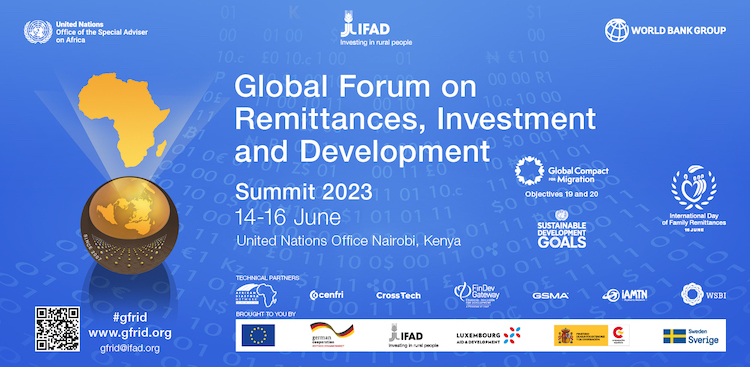By Thalif Deen
UNITED NATIONS, 15 June 2023 (IDN) – In Asia, some of the countries dependent on remittances from migrant workers overseas include India, Sri Lanka, Nepal, China, Bangladesh and the Philippines.
At the international airport in one of the Southeast Asian capitals, there is a sign at the “arrivals” terminal for a special category of VIPs (Very Important Persons)—not royalty nor diplomats but “Migrant Workers Only”.
Reason: the country’s migrant workers, running into millions, are some of the biggest single foreign exchange earners, working mostly in oil-blessed countries in the Middle East, including Qatar, Kuwait, Saudi Arabia and the United Arab Emirates (UAE).
Álvaro Lario, the President the UN’s International Fund for Agricultural Development (IFAD) says almost $1.8 billion in remittances are flowing daily to low and middle-income countries, leveraging development opportunities.
Half of that amount $900 million, is boosting agriculture and rural development” said Lario, speaking at the opening session of the Global Forum on Remittances, Investment and Development (GFRID) in Nairobi on June 14.
Making the most of remittances and diaspora investments can, paradoxically, curb the need for more to migrate. These flows are great contributors to the wellbeing of millions, he said.
Organized jointly by IFAD, the UN Office of the Special Adviser on Africa, and the World Bank Group, the GFRID forum aims to foster a change in mindset among various stakeholders, including public and private partners as well as civil society.
The goal is to fully acknowledge and leverage the potential of remittances and diaspora investments as critical sources of socio-economic development in low and middle-income countries.
A presentation of their conclusions will go before the SDG summit during the UN General Assembly sessions in September this year.
In its press release June 14, IFAD said that in 2022, 200 million migrant workers sent $647 billion to over 800 million family members in low and middle-income countries. This is done with small transactions of $200 on average, 10 to 12 times a year.
In these countries, the combined value of Official Development Assistance (ODA) and foreign direct investment is substantially less than the funds sent by migrants to their loved ones.
Even in times of crisis, the hard-earned money sent home remains a reliable source of income for millions of individuals and families across the world. Remittances allow families to fight poverty, put food on the table, pay medical and education expenses and improve their housing, water and sanitation, according to IFAD.
While migrants mostly send money to cover basic needs, it is estimated that recipients manage to either save or invest 25 per cent of the money they receive. One-quarter of these savings ($25 billion annually) goes into agriculture-related investments. This amount is four times greater than the global ODA allocated to agriculture in developing countries.
“We need to change our perception and recognize migrant workers and diaspora investors as essential development contributors, especially when it comes to climate adaptation,” said Lario.
The President of IFAD advocates for working with the private sector to seize business opportunities, and fully supports the need to harness the potential of these financial flows to achieve the Sustainable Development Goals (SDGs).
Meanwhile, Africa remains of particular interest at the 2023 GFRID, as 17 out of its 54 countries rely on remittances for at least 4 per cent of their GDP. Several countries, including The Gambia, Somalia, Comoros, Lesotho, Cape Verde, and Guinea-Bissau, exceed the 10 per cent threshold.
These findings were outlined in the newly released RemitSCOPE Africa outcome report, which presents the most up-to-date and reliable data on remittances and their impact across all 54 African countries.
The report sheds light on the over $100 billion that annually flow into Africa from its migrant workforce of over 40 million individuals worldwide.
According to RemitSCOPE, the cost of sending remittances to Africa has been significantly reduced. However, with an average price of 8.85 per cent transfer fee to send $200 last year, the continent remains the most expensive region in the world to send money to.
Africa remains far from the 3 per cent target set in the SDGs to be achieved by 2030. Sending money within Africa is even more expensive at 11 per cent transfer fee on average.
Financial inclusion has significantly increased in Africa, rising from 20 per cent in 2011 to 51 per cent in 2021, driven largely by the growing ownership of mobile money accounts, says the report.
South Sudan (6 per cent), Egypt (27.4 per cent) and Sierra Leone (29.1 per cent) present the lowest levels of financial inclusion.
Lario reaffirmed IFAD’s commitment to make the remittances flow faster, and safer while reducing transfer fees. IFAD continues its work to connect incoming funds to a wide range of opportunities in rural finance, benefiting both rural residents and private sector enterprises.
This means boosting access to savings, credit and insurance, basic financial products that can nevertheless be life-changing in poor rural areas.
Since 2006, IFAD has co-funded over 70 projects in more than 50 countries focused on providing opportunities for remittance-receivers and their communities. IFAD has built a network of some 230 partners on the ground from the public sector, private sector and civil society, benefitting at least two million people, according to the press release. [IDN-InDepthNews]
Image credit: UN Office of the Special Adviser for Africa
Visit us on Facebook and Twitter.
IDN is the flagship agency of the Non-profit International Press Syndicate.
We believe in the free flow of information. Republish our articles for free, online or in print, under Creative Commons Attribution 4.0 International, except for republished articles with permission.

